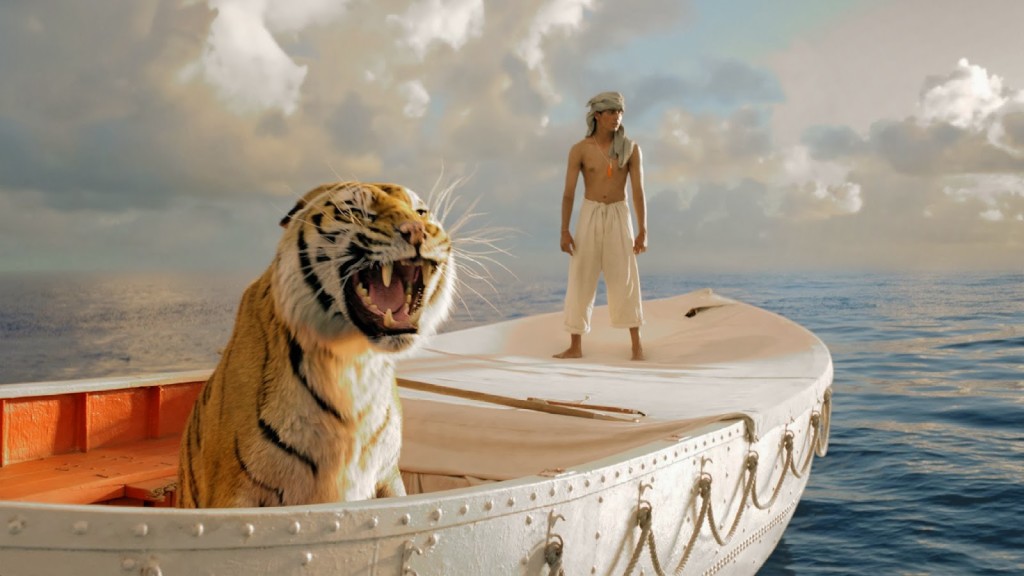Aided and abetted by the use of my Cineworld Unlimited Card, I saw a lot of films at the cinema in 2013. Here’s the first part of my round-up of what I thought of them.
Life of Pi
Based on Yann Martel’s touching, clever philosophical parable, this film was visually stunning and the first of two this year that really justified their use of 3D.
Les Miserables
I love the Christian hope contained in the ending – the lyrics of the final song are fantastic:
For the wretched of the earth
There is a flame that never dies
Even the darkest night will end
And the sun will rise.
They will live again in freedom
In the garden of the Lord
We will walk behind the plough-share
We will put away the sword
But its themes of redemption are tear-jerking despite, not because of, the direction. the incredibly choppy, hand held camera work gives it no sense of scale, and the extreme close ups alienate as often as they draw in. For a better explanation, see Film Crit Hulk’s fascinating essay on Les Mis.
Argo
Tense, gripping thriller about a CIA scheme to get Americans out of the Iranian Revolution, by faking a science fiction movie. Neatly balancing comedy with suspense and danger, it deservedly bagged a heap of awards. Take its version of events with a pinch of salt, of course: it enlarges the Americans’ role and airbrushes out the part played by the Canadian ambassador.
Lincoln
It feels at times like a period version of Aaron Sorkin’s White House set drama The West Wing. The moral weight of the questions of war and slavery give it dignity, but it lacks the scale or flourish to make it really shine as a piece of cinema. Read my full Lincoln review here.
Warm Bodies
Surprisingly fun and touching Romeo and Juliet story between a zombie and human survivor – for more about this, read my article on “why do we love a good apocalypse?”
Wreck it Ralph
An affectionate tribute to video games past and present, it also has real emotional heart with Ralph’s efforts to start again as a good guy rather than video game villain. It follows a typical “chase your own dreams in life rather than what you were made/programmed to do” Disney shtick, but the funny and well-plotted script breathes life into a well-worn formula.
It’s fun playing I Spy with cameos from various video game characters. I only wish that that hard-bitten space marine Commander Calhoun had been voiced by Jennifer Hale (who plays Commander Shepard in Bioware’s fantastic Mass Effect series!)
Cloud Atlas
A gloriously ambitious attempt to bring David Mitchell’s centuries spanning novel to screen. Intercutting between 6 different settings and storylines, it’s a masterclass in editing.
It’s also got some big things to say, even if it doesn’t always say them subtly. “There is a natural order to this world, and those who try to upend it do not fare well”, intones Hugo Weaving’s character ominously, justifying the supposed superiority of the white man over black slaves. Across different time periods, we see various characters struggling to overcome oppressive systems, with their actions rippling through history.
So some great themes, and it juggles the multiple narratives skilfully. But its device of having the same actors playing different roles in various times, in some cases crossing race and gender, is in rather dubious taste, and results in some rather silly wigs and prosthetics. The film also simplifies much of the novel’s complexity and nuance, especially the altered, more upbeat ending.
Does it hang together? Not quite. But I love the film for trying. Personally I’d rather a story that’s over-ambitious that falls short, than just another generic blockbuster. Speaking of which…
The Host
Andrew Niccols’ track record with Gattaca and The Truman Show gave me hope that he would do something interesting with Stephanie Meyers’ other, non vampire novel. In it, the Earth has been invaded by floaty silver aliens who possess human beings. Only a few scattered human survivors remain free. But when Melanie Stryker is caught and possessed by the Wanderer (nicknamed Wanda), she fights back for control of her own body…
I was rather disappointed, with even the talented Saoirse Ronan unable to overcome the hokeyness of arguing with her own voice-over. That kind of inner conflict perhaps works better in the book, which I haven’t read, but its translation to screen seems ham-fisted. Playing to the post-Twilight audience, there’s a rather weird love square (rather than triangle), with Melanie and Wanda falling in love with different young men. There are some intriguing ideas here, and the way that the aliens seem to have made the world genuinely more peaceful and harmonious adds a nice note of moral ambiguity, but for me it fell quite flat.
So that’s the first few! Check back soon as I move on to more 2013 films, including many of the summer blockbusters…

